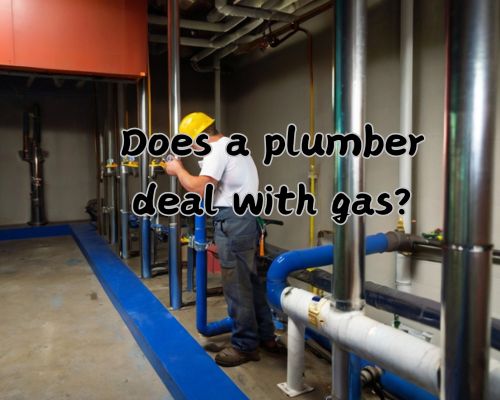If you’re a homeowner, you may be wondering whether a plumber can deal with gas lines. The short answer is yes, but it depends on their qualifications and licensing.

Plumbers can work on gas lines, but only if they have the proper certification and licenses to do so.
It’s important to note that gas lines can be dangerous if not handled properly. Therefore, it’s crucial to hire a licensed and experienced professional like Gas Plumber Warragul to work on your gas lines.
A licensed gas fitter is a professional who specializes in the installation, testing, maintenance, and repair of gas lines and gas appliances. They work with natural gas, liquefied petroleum gas, and propane systems that are typically used for hot water systems.
When it comes to safety, it’s essential to ensure that your gas lines are installed and maintained correctly. Gas leaks can be hazardous and potentially life-threatening, so it’s crucial to have a licensed professional handle any gas line work.
Roles and Responsibilities of Plumbers in Gas Work
When it comes to gas-related plumbing, there are often questions about the roles and responsibilities of plumbers. While plumbers primarily work with water supply and sewage lines, they can also provide gas plumbing services. Here are some of the roles and responsibilities of plumbers in gas work.
Installation and Maintenance of Gas Lines
Plumbers are qualified to install and maintain gas lines in residential and commercial settings.
This involves connecting gas lines to appliances, such as stoves and hot water systems. Plumbers can also install gas meters and regulators.
In addition to installation, plumbers are responsible for the ongoing maintenance of gas lines.
This includes regular inspections to ensure that gas lines are in good condition and free from leaks. Plumbers can also perform routine maintenance tasks, such as replacing worn-out gas fittings and valves.
Repair and Safety Measures for Gas Systems
If you have a gas leak or a faulty gas appliance, a licensed professional plumber can help.
Plumbers are trained to diagnose and repair gas-related issues, such as leaks and blockages. They can also replace faulty gas appliances, such as hot water systems and gas heaters.
Plumbers are also responsible for implementing safety measures for gas systems.
This includes ensuring that gas pipes and fittings are properly secured and that gas appliances are installed correctly. Plumbers can also advise on the safe use of gas appliances and provide tips for detecting gas leaks.
Regulations and Qualifications for Gas-Related Plumbing
In Australia, there are regulations and qualifications that plumbers must adhere to when working with gas.
Dean Owens of Gas Plumber Warragul highlights that “Plumbers who work with gas must hold a Gas Work Licence, which is issued by the relevant state or territory authority. This licence ensures that the plumber has the necessary skills and knowledge to work safely with gas.”
In addition to qualifications, there are also regulations that plumbers must follow when working with gas.
For example, gas installations must comply with the Australian Standards for Gas Installations. Plumbers must also follow safety standards, such as ensuring that gas appliances are properly ventilated.
Understanding Gas Systems in Plumbing
Gas plumbing is an essential aspect of plumbing services, and it involves the installation, maintenance, and repair of gas lines, gas pipes, fittings, and fixtures. Understanding gas systems in plumbing is crucial to ensure the safety of your property and prevent potential gas leaks.
Components and Materials of Gas Plumbing
Gas plumbing systems comprise various components, including gas pipes, fittings, valves, and appliances.
Gas pipes are typically made of copper, steel, or plastic, and they transport natural gas from the gas meter to various appliances in your property. Fittings, on the other hand, are used to connect gas pipes and appliances, and they come in various sizes and shapes.
When it comes to gas plumbing, materials are crucial, and it’s essential to use high-quality materials to ensure the safety and longevity of your gas plumbing systems.
Copper and steel pipes are commonly used in gas plumbing, while plastic pipes are ideal for underground gas lines.
Identifying and Addressing Gas Leaks
Gas leaks can be dangerous, and it’s crucial to identify and address them promptly.
Some signs of gas leaks include a hissing sound near gas pipes, a rotten egg smell, or dead plants or grass around the gas line. If you suspect a gas leak, turn off the gas supply immediately and contact a professional gas plumber.
Professional gas plumbers have the necessary skills and experience to identify and address potential gas leaks.
They use specialized equipment to detect gas leaks and take corrective measures to prevent further damage. Regular maintenance of gas plumbing systems can also help prevent potential gas leaks.
The Importance of Professional Gas Line Services
Gas plumbing is a specialized field. It requires experienced professionals to ensure the safety of your property.
Professional gas plumbers have the necessary training, knowledge, and equipment. They can handle gas plumbing systems safely and effectively.
Attempting to handle gas plumbing systems without the necessary skills and equipment can be dangerous. It may result in gas leaks or other hazards.
It’s essential to hire a professional gas plumber for all your gas plumbing needs. This includes installation, maintenance, and repair.